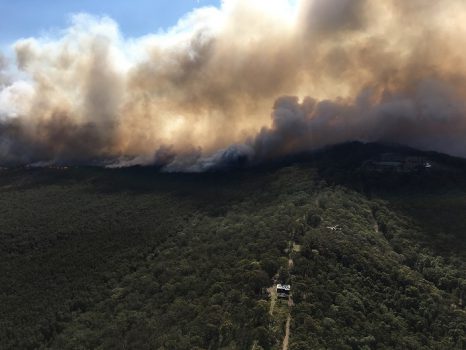Mayors from thirteen councils have signed a statement calling on the federal government to acknowledge the link between climate change and the catastrophic fires that have swept through NSW and Queensland.
The federal government has so far refused to acknowledge that climate change may be central factor in the bushfires, which have destroyed hundreds of homes and claimed four lives.
In their statement, Mayors from Bellingen, Noosa, MidCoast, Byron Shire, Tweed Shire, Shoalhaven, City of Sydney, Lismore, Ryde, Hawkesbury, Hornsby, Newcastle and Blue Mountains say climate change can no longer be ignored.
“The catastrophic conditions for these fires were, at least in part, fuelled by climate change,” the statement says. “Now it is time to honestly and bravely address one of the major causes of these fires.”
The mayors call on the federal government to heed warnings from the front line and stop the blame game.
“We need the government to acknowledge the link between climate change and bushfire, we need more funding for all emergency services, and we need the government to take the action required to prevent megafires.”

Time to talk about ‘the new normal’
Bellingen Mayor Dominic King said it was time to start talking about “the new normal”.

He said the fires breaking out in traditionally wet rainforest were unprecedented, with a dry winter and spring causing trees to shed leaves and limbs that created fuel for the fires.
Cr King accused the state and federal governments of ignoring the science around climate change.
“What we’re seeing in local government and around the world is people standing up and saying, ‘this can’t continue’,” he told Government News. “We are facing ten years of record breaking temperatures, low rainfall, diabolical drought, and now on top of that catastrophic fires.”
He said he was particularly concerned about the loss of biodiversity, the impact on the local koala community and the potential threat to four 100-year-old fig trees in the area.
He also said the local economy faced a blow from lost tourism dollars as visitors shunned bushfire prone parts of state.
Noosa Mayor Tony Wellington said his community had experienced two months of extreme fire conditions, and recently saw the evacuation of 8,000 houses.
“The word ‘unprecedented’ keeps popping up,” he said. “What that demonstrates it that we are experiencing fire and weather conditions that are very different to what we’ve been accustomed to.
“Obviously there is a pattern in the change of weather and that can only be attributed to climate change.”

Simon Richardson, Mayor of Byron Shire, said storms, heavy rainfall and flooding were the usual extreme weather events to affect his sub-tropical LGA. But he said changing weather had seen hotter temperatures, Melbourne-style humidity and a landscape “as dry and brown as Victoria in Summer”.
“It’s not just the fact that there’s fires, there’s also very unsual temperatures and weather patterns in general,” he told Government News.
He said the government’s response that now isn’t the time to talk about the cause of the fires was nonsensical.
“If there’s a big car accident of course it’s time to talk about speeding or drink driving. There’s moments of crisis where yes, it may be uncomfortable … but as a wider community we’ve got to discuss it. Because when things quieten often the interest does.”
Briefing paper calls for end to fossil fuels
The joint statement is an initiative of the Climate Council, which has 115 Australian councils represented on its local government climate program and recently released a briefing paper which found the fire conditions currently facing eastern Australia have been exacerbated by climate change.

Climate change had contributed to drought, created an abundance of dry fuel and lengthened the fire season.
The paper, which draws on data from CSIRO and the Bureau of Meteorology, as well as a range of peer-reviewed scientific papers, calls on the government to develop a plan to rapidly phase out fossil fuels.
“For well over 20 years scientists have warned that climate change would increase the risk of extreme bushfires in Australia,” the paper says.
“This warning was accurate. Scientists expect extreme fire weather will continue to become more frequent and severe without substantial and rapid action to reduce greenhouse gas emissions.”
Dr Annika Dean, a senior researcher with the Climate Council, says climate change has driven an increase in temperatures across Australia, shifted rainfall patterns and made some areas drier.
“Fire danger ratings are influenced by dryness, temperature, humidity and wind speeds. When conditions are dry and hot, fuels are more flammable, and when the winds are strong, fires can spread quickly,” she told Government News.
Dr Dean said fast-tracking the elimination of fossil fuels to drive down greenhouse gas emissions as part of a global effort to tackle climate change would help mitigate the risk and severity of bushfires in the future.





Very Refreshing to see at least some levels of government are facing up to the reality of this environmental and ecological disaster. To often the debate centres around the economical Vs environmental impacts. The recent statements by the Deputy Prime Minister are illustrative of this fallacious argument. No amount of export coal dollars will ever compensate or provide comfort when the environment and ecosystem which we and the other species we share this planet with, who are often overlooked in this debate, rely on for our survival is reduced to an uninhabitable, poisoned wasteland. We need to re-define our view of “standard of living” and “Quality of life” Its high time we see this not simply as the homes we own or the other materialistic possessions we accumulate – but the air we breathe, the water we drink and the bio-diversity which makes life worth living!
As the climate warms, and there is no doubt it is doing so, these issues will only get worse. I don’t often hear it mentioned. Do people think we’ll have a bad season this year, and then things will get better again?
The bushfires will get worse and more devastating with each passing year on average, as our country gets warmer and drier. This has been predicted by science for many years and we are seeing it in action right now. The only problem – it’s worse than predicted!
Why isn’t anyone talking about what will happen next year, and the next, and the next?
Our children are completely innocent in this. They bear zero responsibility for the human induced climate change that is currently occurring. Yet they will be the most affected as climate disaster devastates this country. How is this fair on our children?
Why aren’t all Australian parents asking for action to prevent it, or at least to do OUR part in preventing it?
It is past time for all levels of government to acknowledge the science of climate change and the predicted impacts going forward. If you believe the science that tells us the earth has experienced ice ages, then that same science tells us that global warming is happening now and it will impact us for generations to come. Australia needs a national 50 year plan to manage the impacts. We all know that government budgets are dependent on coal royalties but this industry will eventually close down anyway so plan now, and make the change. We need to show some world leadership and faze out fossil fuels. We need to secure our water, stormwater reticulation, dams for when it rains again, reduce irrigation licences etc. We need more aerial fire bombers because the bush will always burn. These are some of the things that need to be locked into a national 50 plan. I can think of a few more but first our government needs to acknowledge a climate emergency. We all then need to accept the implications, do what we can to limit the impacts and defend our kids future.